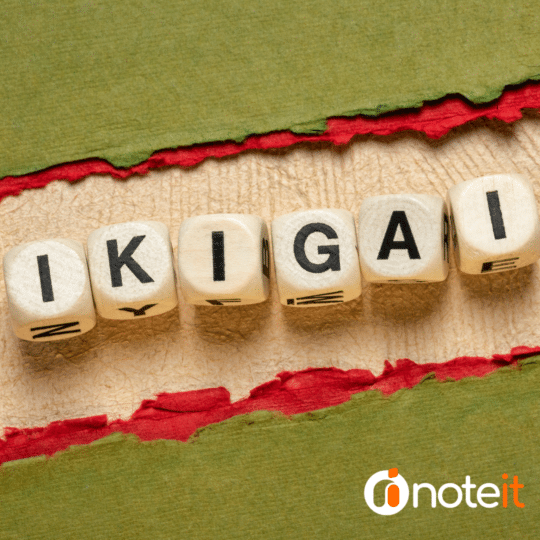Balancing our working lives and our social lives is increasingly at the forefront of the workplace conversation in 2021. Faced with an extended pandemic and hundreds of millions of us working from home day to day, the need to find a balance between home life and work life has become ever more urgent. As jobs become digitised, many workers are beginning to question the worthiness of the work they’re producing, and more often than not, this leads to dissatisfaction. The Japanese concept of ikigai aims to resolve all of these problems, and to provide us with happier, healthier working lives.
What is ikigai?
There is no direct English translation of ikigai, which is thought to date back over a thousand years in Japanese history. It comes from two Japanese words: iki, which means life, and gai, which means worth, or value. The most succinct summary of the concept is perhaps ‘the thing that motivates you to get up in the morning’. It’s your raison d’etre; your reason for being, your Why.
When people write about ikigai, it’s often accompanied by a Venn diagram detailing four overlapping areas. These are:
- What you love
- What you are good at
- What the world needs
- What you can be paid for
The difference between ikigai and passion
The concepts then overlap in various ways. Your ikigai will be something that has each of these qualities. If you only have one or two, it’s not your ikigai. For example, if you find something you love that you are also talented at—say, building snowmen—you will have found a passion of yours, but not your ikigai. Why? Because you are not likely to be paid by anybody for building snowmen, and the world isn’t exactly despairing at a lack of them.
The difference between finding your ikigai and finding your mission
Perhaps there’s something the world needs dearly, which you also enjoy doing. For example, maybe you truly enjoy donating to charities, and it gives you an enormous sense of wellbeing and happiness. This is your mission, but it’s not your ikigai, as it misses out the two other crucial qualities of ikigai: doing something you’re good at, and doing something through which you can earn a living (or at least be paid for).
The difference between finding a vocation and finding your ikigai
A vocation is something the world needs that you can be paid for. Again, when these two qualities overlap, you’re a good way towards finding your ikigai, but you’re not quite there yet. Your vocation could be a great many things; in fact it’s possible that many employees out there who are dissatisfied in their professions have found a vocation rather than their ikigai. This could be an office admin job which is necessary in society and pays well, but you neither love nor are particularly talented at. To be truly satisfied and joyful in your working life, you need the whole set.
The difference between your ikigai and your profession
Your profession is something you are good at and can be paid for. However, this is not necessarily something you love, and it’s not necessarily something the world needs. Imagine a painter who has spent their whole life learning to hone their craft, and is capable of creating fine works of art and even replicating the greats. If you hired them to paint traffic signs, they’d be able to earn a decent wage, and their traffic signs would be second to none… but it’s a stretch to believe they’d be satisfied or fulfilled.
Japanese vs Western interpretations of the concept
The ikigai Venn diagram is more commonly used in the West to explain the concept. For many people in Japan, the ‘what you can be paid for’ quality is unimportant; in fact, in a survey conducted in 2010, it was found that only one-third of Japanese people asked detailed their career as their ikigai. This shows that, while your reason for being certainly can be your job or career path, it definitely doesn’t have to be.
The reason the concept has been interpreted slightly differently by the Western world is due, in part, to translation issues. In the English language, the word ‘life’ can refer to daily life, such as in the question ‘how’s life treating you?’ yet it can also refer to a lifetime. In Japan, however, there are distinct words to separate the meanings. Therefore, when translating the concept into English, Westerners often understand the ‘life purpose’ meaning of ikigai as something far more grandiose than it necessarily is. Simply, it’s something you adore doing that gives you purpose and gets you up in the morning. And if it can earn you a living? Much the better!
Can finding your ikigai help you live a longer, happier life?
Japan famously has one of the highest life expectancies in the world, and researchers who have looked into Japanese culture believe that finding a reason for being factors into this longevity. Older people are particularly respected in Japanese society, and can often find their daily purpose in passing on their knowledge, skills and stories to the younger generation.
The most important factor for many proponents of ikigai is seeing your work making a difference in people’s lives, and in the surrounding world. This makes the concept particularly relevant in the modern age, where many people have tech-orientated jobs that may not make a large impact on the physical world, or a noticeable improvement to people’s daily lives. This can and does, lead to burnout and career confusion.
But finding your ikigai and following it, you can escape this perplexing cycle and find meaningful, fulfilling work which plays to your strengths and changes the world around you. This might be starting up your own business, seeking a new education and a new career path, or perhaps simply finding joy in small, daily tasks. However you go about finding your ikigai, a happier and more purposeful life awaits.



